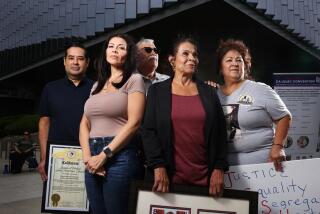Vital Legacy of Nancy Cruzan : Issue is not so much the right to die but the right to live as one sees fit
- Share via
An ambivalent U.S. Supreme Court ruling wound up giving a lower court the room it needed recently to halt the forced feedings of Nancy Cruzan. Without the feeding tubes in place to maintain her state of permanent unconsciousness, the 33-year-old Missouri woman will die soon. While it will be a merciful end, the thought of it is no cause for cheer. But it is cause to appreciate what Nancy and parents Joe and Joyce Cruzan have given to others in the nearly eight years since Nancy left life as she valued it.
Nancy Cruzan was involved a serious car accident in 1983. Since then she has been able to breathe on her own but has no awareness of herself or her surroundings. She is in what doctors call a “persistent vegetative state.” Her parents fought--against strict Missouri state laws and a tenacious attorney general’s office--to make the decision that their daughter would have made. Nancy Cruzan had told friends that she would not want to be fed by force or kept alive by machines.
The Cruzans’ cause attracted much attention to the “right-to-die”; but the larger importance of the Cruzan case is not the right to die, but the right to live as one sees fit. It is about understanding medical options and the consequences of accepting or refusing treatment.
One national law that resulted from the Cruzan case takes effect late next year. It will require most hospitals and other health-care facilities to inform patients of their medical-care rights if they become incapacitated.
In California, the legal effect of the Cruzan case has been minimal because state law and a state constitutional guarantee of privacy make it easier for next of kin or a designate to act in what is considered the best interests of an incapacitated person. But the publicity surrounding the Cruzan case has been an effective prod in persuading many people to make legal arrangements; the publicity also no doubt sparked many informal conversations about the case. Such conversations could be cited later as evidence of a person’s wishes regarding prolonged or extraordinary medical treatment.
Thus Nancy Cruzan’s legacy is the better chance that other tragedies such as hers can be averted.
More to Read
Sign up for Essential California
The most important California stories and recommendations in your inbox every morning.
You may occasionally receive promotional content from the Los Angeles Times.













